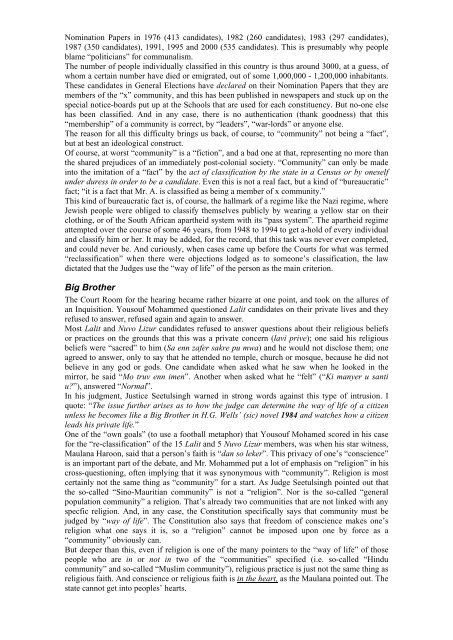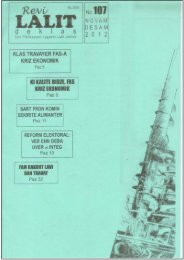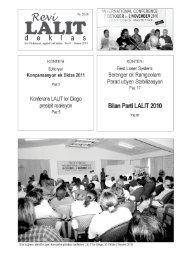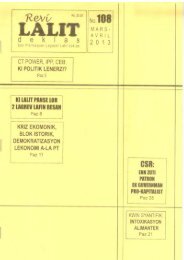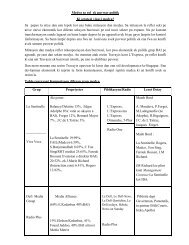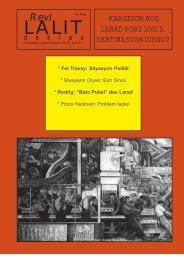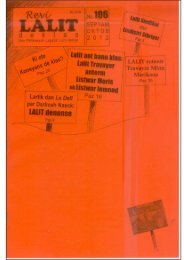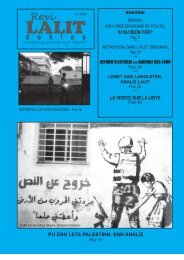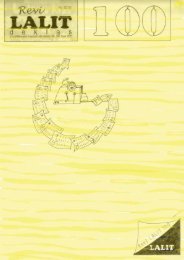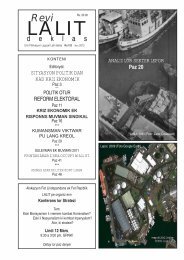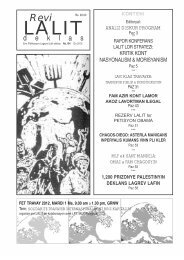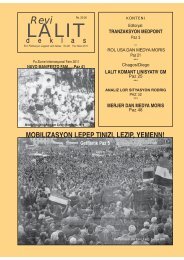Against communalism of the best-loser system - Lalit Mauritius
Against communalism of the best-loser system - Lalit Mauritius
Against communalism of the best-loser system - Lalit Mauritius
Create successful ePaper yourself
Turn your PDF publications into a flip-book with our unique Google optimized e-Paper software.
Nomination Papers in 1976 (413 candidates), 1982 (260 candidates), 1983 (297 candidates),<br />
1987 (350 candidates), 1991, 1995 and 2000 (535 candidates). This is presumably why people<br />
blame “politicians” for <strong>communalism</strong>.<br />
The number <strong>of</strong> people individually classified in this country is thus around 3000, at a guess, <strong>of</strong><br />
whom a certain number have died or emigrated, out <strong>of</strong> some 1,000,000 - 1,200,000 inhabitants.<br />
These candidates in General Elections have declared on <strong>the</strong>ir Nomination Papers that <strong>the</strong>y are<br />
members <strong>of</strong> <strong>the</strong> “x” community, and this has been published in newspapers and stuck up on <strong>the</strong><br />
special notice-boards put up at <strong>the</strong> Schools that are used for each constituency. But no-one else<br />
has been classified. And in any case, <strong>the</strong>re is no au<strong>the</strong>ntication (thank goodness) that this<br />
“membership” <strong>of</strong> a community is correct, by “leaders”, “war-lords” or anyone else.<br />
The reason for all this difficulty brings us back, <strong>of</strong> course, to “community” not being a “fact”,<br />
but at <strong>best</strong> an ideological construct.<br />
Of course, at worst “community” is a “fiction”, and a bad one at that, representing no more than<br />
<strong>the</strong> shared prejudices <strong>of</strong> an immediately post-colonial society. “Community” can only be made<br />
into <strong>the</strong> imitation <strong>of</strong> a “fact” by <strong>the</strong> act <strong>of</strong> classification by <strong>the</strong> state in a Census or by oneself<br />
under duress in order to be a candidate. Even this is not a real fact, but a kind <strong>of</strong> “bureaucratic”<br />
fact; “it is a fact that Mr. A. is classified as being a member <strong>of</strong> x community.”<br />
This kind <strong>of</strong> bureaucratic fact is, <strong>of</strong> course, <strong>the</strong> hallmark <strong>of</strong> a regime like <strong>the</strong> Nazi regime, where<br />
Jewish people were obliged to classify <strong>the</strong>mselves publicly by wearing a yellow star on <strong>the</strong>ir<br />
clothing, or <strong>of</strong> <strong>the</strong> South African apar<strong>the</strong>id <strong>system</strong> with its “pass <strong>system</strong>”. The apar<strong>the</strong>id regime<br />
attempted over <strong>the</strong> course <strong>of</strong> some 46 years, from 1948 to 1994 to get a-hold <strong>of</strong> every individual<br />
and classify him or her. It may be added, for <strong>the</strong> record, that this task was never ever completed,<br />
and could never be. And curiously, when cases came up before <strong>the</strong> Courts for what was termed<br />
“reclassification” when <strong>the</strong>re were objections lodged as to someone’s classification, <strong>the</strong> law<br />
dictated that <strong>the</strong> Judges use <strong>the</strong> “way <strong>of</strong> life” <strong>of</strong> <strong>the</strong> person as <strong>the</strong> main criterion.<br />
Big Bro<strong>the</strong>r<br />
The Court Room for <strong>the</strong> hearing became ra<strong>the</strong>r bizarre at one point, and took on <strong>the</strong> allures <strong>of</strong><br />
an Inquisition. Yousouf Mohammed questioned <strong>Lalit</strong> candidates on <strong>the</strong>ir private lives and <strong>the</strong>y<br />
refused to answer, refused again and again to answer.<br />
Most <strong>Lalit</strong> and Nuvo Lizur candidates refused to answer questions about <strong>the</strong>ir religious beliefs<br />
or practices on <strong>the</strong> grounds that this was a private concern (lavi prive); one said his religious<br />
beliefs were “sacred” to him (Sa enn zafer sakre pu mwa) and he would not disclose <strong>the</strong>m; one<br />
agreed to answer, only to say that he attended no temple, church or mosque, because he did not<br />
believe in any god or gods. One candidate when asked what he saw when he looked in <strong>the</strong><br />
mirror, he said “Mo truv enn imen”. Ano<strong>the</strong>r when asked what he “felt” (“Ki manyer u santi<br />
u?”), answered “Normal”.<br />
In his judgment, Justice Seetulsingh warned in strong words against this type <strong>of</strong> intrusion. I<br />
quote: “The issue fur<strong>the</strong>r arises as to how <strong>the</strong> judge can determine <strong>the</strong> way <strong>of</strong> life <strong>of</strong> a citizen<br />
unless he becomes like a Big Bro<strong>the</strong>r in H.G. Wells’ (sic) novel 1984 and watches how a citizen<br />
leads his private life.”<br />
One <strong>of</strong> <strong>the</strong> “own goals” (to use a football metaphor) that Yousouf Mohamed scored in his case<br />
for <strong>the</strong> “re-classification” <strong>of</strong> <strong>the</strong> 15 <strong>Lalit</strong> and 5 Nuvo Lizur members, was when his star witness,<br />
Maulana Haroon, said that a person’s faith is “dan so leker”. This privacy <strong>of</strong> one’s “conscience”<br />
is an important part <strong>of</strong> <strong>the</strong> debate, and Mr. Mohammed put a lot <strong>of</strong> emphasis on “religion” in his<br />
cross-questioning, <strong>of</strong>ten implying that it was synonymous with “community”. Religion is most<br />
certainly not <strong>the</strong> same thing as “community” for a start. As Judge Seetulsingh pointed out that<br />
<strong>the</strong> so-called “Sino-Mauritian community” is not a “religion”. Nor is <strong>the</strong> so-called “general<br />
population community” a religion. That’s already two communities that are not linked with any<br />
specfic religion. And, in any case, <strong>the</strong> Constitution specifically says that community must be<br />
judged by “way <strong>of</strong> life”. The Constitution also says that freedom <strong>of</strong> conscience makes one’s<br />
religion what one says it is, so a “religion” cannot be imposed upon one by force as a<br />
“community” obviously can.<br />
But deeper than this, even if religion is one <strong>of</strong> <strong>the</strong> many pointers to <strong>the</strong> “way <strong>of</strong> life” <strong>of</strong> those<br />
people who are in or not in two <strong>of</strong> <strong>the</strong> “communities” specified (i.e. so-called “Hindu<br />
community” and so-called “Muslim community”), religious practice is just not <strong>the</strong> same thing as<br />
religious faith. And conscience or religious faith is in <strong>the</strong> heart, as <strong>the</strong> Maulana pointed out. The<br />
state cannot get into peoples’ hearts.


